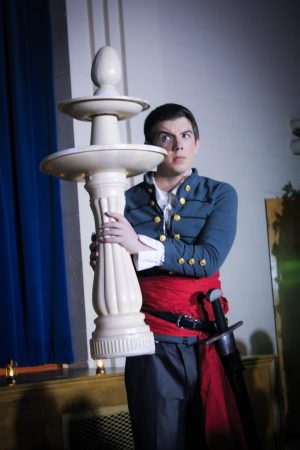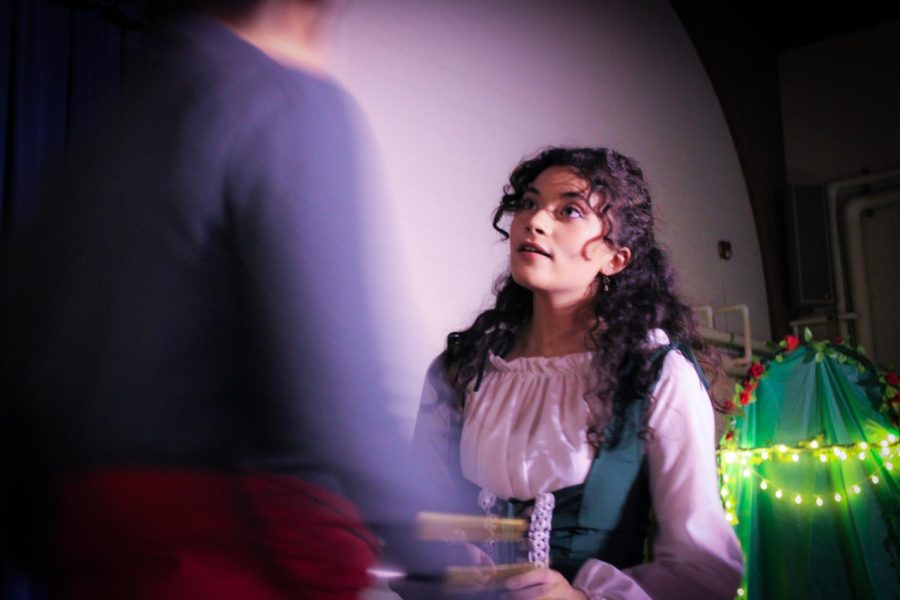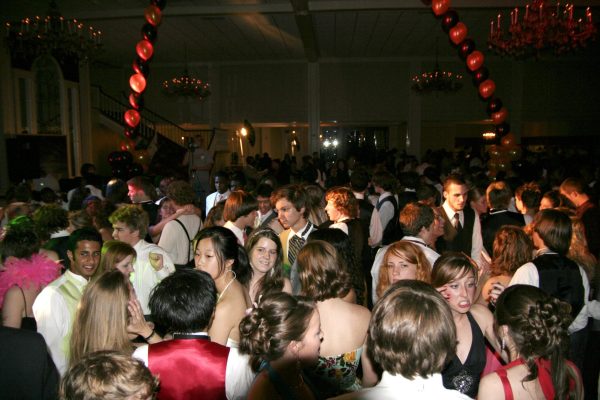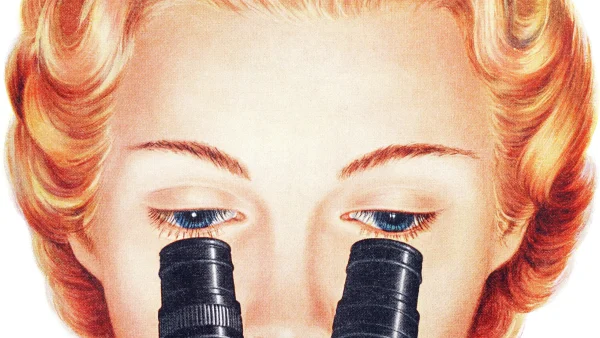Much ado about everything for AMSA Drama Society
Mia Downing’s performance as Beatrice helped make AMSA’s production of Much Ado About Nothing a triumph.
Students may think they know Shakespeare’s classic comedy Much Ado About Nothing, but they don’t unless they saw the AMSA Drama Society’s winter production of the play. Portrayals by the lead actors, Mia Downing (Beatrice) and Alex McCullough (Benedick), made for captivating and memorable performances, both for those familiar with the play and, more strikingly, for those who had perhaps never heard of it.
The comedy features two sets of romantic pairings that arise when a group of soldiers return to Messina and the complications that follow. Benedick and Beatrice have both sworn off marriage and engage in a witty war of words before being tricked by their friends that they are in love with one another.
It is a blueprint for the romantic-comedy genre.
Count Claudio, meanwhile, falls in love with Hero, the governor’s daughter, and is deceived by a plan by Don John, a villain who wishes to ruin the oncoming wedding between the two for seemingly no reason other than his own misery.
It was obvious that the AMSA troupe did what it could with the limited resources of a church auditorium, featuring only a small stage and folding chairs. The curtains remained closed through the first scenes, which instead took place on the floor before the stage, where the actors were so close to the audience that they could trip over the feet of those in the front row.
The set was modest, yet whimsical: fairy lights and vine garlands adorned the partitions lining each side of the room, and the set on the floor consisted of a couple of chairs, a bench, and a small fountain in the center. The music choices were always comedic, ranging from spy music to a guitar solo.
Alex continually demanded the crowd’s attention with his triumphant and almost over-the-top delivery. By far the most successful at delivering Shakespeare’s jokes, he left the audience laughing every time he was on stage, even if they did not understand the play’s language in full.
His soliloquies were never dull, and he spoke with proud articulation — at times even speaking directly to members of the audience in the front row, involving them in something they may otherwise have felt disconnected from. Alex captured Benedick’s proud-yet-humorous character precisely as Shakespeare wrote him on the page.
Mia’s performance as the cynical-and-marriage-despising Beatrice was authentic and served as the perfect counterpart to Alex’s haughty Benedick, at once witty and sarcastic and yet quietly passionate.

Her dry delivery complemented Benedick’s, consistent with the enemies-to-lovers romance Shakespeare had in mind, replete with sharp matches of verbal sparring. Mia successfully conveyed the vulnerability in Beatrice’s character when she confessed her love for Benedick, revealing a side of herself hidden underneath a hard exterior.
At the height of her performance, when Beatrice tells Benedick to kill Claudio for seemingly slandering Hero, Mia proved her commitment to the role and her understanding of Beatrice as a strong female lead who will not take no for an answer.
Mia’s passionate portrayal drew the audience in to side with Beatrice, who, in true Shakespearean fashion, has all the intelligence and tenacity to be a forceful character but who is ultimately prevented from being a driving force by her position as a woman.
Lighting, music, and acting all came together to present the play’s villain, Don John, played by Vedant Roymoulik. The lighting shifted to a red tone and sinister music would begin to play every time he took the stage, making it as clear as possible that this character was the perpetrator of much of the wrongdoing.
Vedant successfully conveyed Shakespeare’s bastard villain through a uniform approach to the role, always exhibiting the same solemn-yet-hostile countenance, albeit with a few evil laughs every now and then. His well-executed villainous persona was purposely disrupted by a pratfall during his flee from Messina, closing out his time on the stage with the humorous tone that was consistent throughout the whole performance.
The couple of Hero (Kirsten Evans) and Claudio (Dalton Burkhart) was perfectly cast and added another level of authenticity to the show. Kirsten added a sense of grace and honesty to the role, allowing the audience to sympathize with her when she is slandered. Dalton’s passionate portrayal of the lovesick Claudio was similar to Alex’s in grandeur, communicating more through his expressions than through the lines themselves.
The watch led by Dogberry (Julia Silva) served as an example of middle/high school theater in its truest form, consisting of the younger actors of the cast marching into the room sporting duct tape swords and spears. Dogberry galloped around on a stick horse while his partner added silly sound effects, making their scenes entirely amusing and a source of comic relief during the tense atmosphere following Hero’s slandering.
The masquerade scene was notable as well, taking place on the floor before the stage where characters wore an interesting assortment of masks. The boys struck a pose at the start of the scene, each wearing an animal mask, a choice that only added to the humor of the play.
Choosing a Shakespearean comedy proved a surprising success for AMSA’s Drama Society, which transported the play from Messina into the 21st century through humorous directorial choices and outstanding acting.
The task of having middle and high school students memorize Shakespeare is obviously difficult and daunting in itself, but they went above and beyond by truly recognizing how to present the play in a way that would be understandable and also memorable to the audience.
It all worked and, as Shakespeare would say, all’s well that ends well.

Ashley is a senior, and this is her first year writing for The AMSA Voice. She has attended AMSA since 6th grade and is excited to further her involvement...






